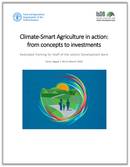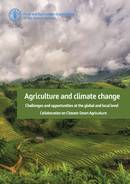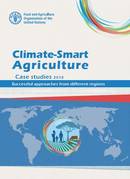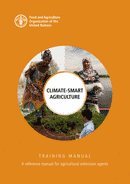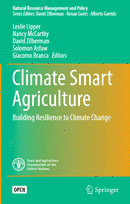Rapports techniques
This training booklet contains core information from the training, including but not limited to: learning objectives, learning materials, and key CSA Sourcebook Chapters. The training booklet also provides useful links to additional learning resources, as well as key FAO publications for future reference.
This report is intended to provide an overview of the activities implemented by the project GCP/GLO/534/ITA “International Alliance on Climate-Smart Agriculture” - funded by the Ministry of Environment, Land and Sea of Italy and implemented by the Food and Agriculture Organization of the United Nations - which supported the creation and implementation of the Global Alliance for Climate-Smart Agriculture and its role in advancing knowledge learning, sharing, and partnership building around the CSA approach. The various activities and products described in this report show how the project has helped on filling knowledge and implementation gaps, developing assessments and tools for promotion and implementation of CSA actions.
This manual is intended for agricultural extension agents and others interested in developing training courses on climate-smart agriculture. The manual intends to answer the following questions:
What is climate change and what are its causes? How will climate change affect agriculture? What can be done to support agricultural producers, both male and female, to adjust to new conditions? What are practical solutions that agricultural producers and others can put into practice? What types of changes will other stakeholders need to make in order to introduce climate-smart agriculture? How does a trainer structure a participatory capacity-development process? How can climate change can be effectively communicated to food producers?
Climate Smart Agriculture (CSA) is an approach to guide the management of agriculture in the era of climate change. The concept was first launched in 2009, and since then has been reshaped through inputs and interactions of multiple stakeholders involved in developing and implementing the concept. CSA aims to provide globally applicable principles on managing agriculture for food security under climate change that could provide a basis for policy support and recommendations by multilateral organizations, such as UN’s FAO. The major features of the CSA approach were developed in response to debates and controversies in climate change and agricultural policy for sustainable development. The purpose of this paper is to give an overview of the evolution of CSA, introduce its major components, and summarize the key debates associated with it within the context of climate change and agricultural policy debates The first section provides an overview of international climate change policy followed by an introduction and analysis of CSA and its history. This is then followed by a discussion of three broad controversies related to CSA, namely the role of mitigation, the relationship of CSA to sustainable agriculture, and way biotechnology is treated in the CSA approach.

